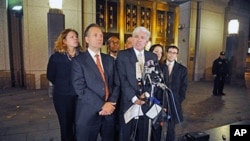Influential members of Congress say Wednesday's landmark terror trial verdict in New York should put a halt to further civilian trials of suspected foreign terrorists in the United States. The conviction of a Tanzanian man of involvement the 1998 U.S. embassy bombings in Africa has provoked strong reactions in Washington and across the United States.
From the start, the federal trial of Tanzanian Ahmed Ghailani was seen by many as a test of the U.S. civilian court system's ability to prosecute foreign terror suspects. And now the verdict is in - perhaps in more ways than one.
Related video report by Carolyn Presutti
Of hundreds of charges relating to the 1998 U.S. embassy bombings in Africa, a jury found Ghailani guilty of only one count of conspiracy.
His attorney, Peter Quijano, was jubilant, and thanked the judge and jury for a "fair trial".
"Even before this verdict I believed in the system and I believed in jury trials," said Quijano.
Not so pleased are U.S. lawmakers who have long-resisted the Obama administration's desire to try terror suspects held at Guantanamo Bay, Cuba in civilian courts rather than military tribunals.
Independent Democratic Senator Joe Lieberman is chairman of the Senate Homeland Security Committee:
"I think the Ghailani verdict is not quite the death knell [end] of civilian trials of detainees, but it makes it highly unlikely that many more will happen," said Lieberman. "To me, we are in a war. And people you capture in a war should be held in a military setting."
Lieberman told VOA that, not only does the Ghailani verdict complicate future prosecutions, it also makes the president's goal of closing Guantanamo vastly more difficult to achieve.
"I do not think there is any real prospect that Congress will allow Guantanamo to be closed in the next two years," he said. "This decision makes it even harder, because it suggests we are going to need a place to keep detainees. And Guantanamo is way up above international standards for incarceration, and it has facilities for military trials."
The man who will be Speaker of the House of Representatives beginning next year, Republican John Boehner, was even more blunt. In a statement, Boehner said the Ghailani verdict is further proof that the plan to try terror suspects in civilian courts was "wrong from day one". He called on the Obama administration to reverse course, keep all other Guantanamo Bay detainees off U.S. soil, and prosecute them in military courts.
Human rights and civil liberties groups take a different view. The Washington director of Human Rights Watch, Tom Malinowski, says the Ghailani verdict shows that civilian judges and juries are entirely capable of delivering justice - even if the verdict is not to everyone's liking.
"A jury of Americans in New York City, very close to ground zero, was able to deliberate and issue not the verdict the government wanted," said Malinowski. "It shows that American courts and American juries are independent and thoughtful and take their responsibilities very, very seriously."
Malinowski added that a military tribunal might well have yielded the same outcome in the Ghailani case as the civilian court did.
Speaking with reporters, White House Press Secretary Robert Gibbs noted that the Ghailani conviction carries a hefty prison sentence of at least 20 years without parole, and that Ghailani will not be threatening American lives as a result of the verdict. He said President Barack Obama remains committed to closing the U.S. detention facility at Guantanamo Bay, even though his initial timeframe - within a year of taking office - has long-expired.




